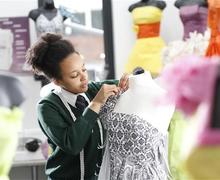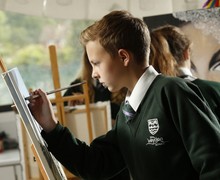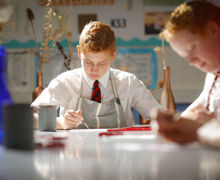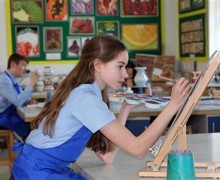Art & Design
Back to Subjects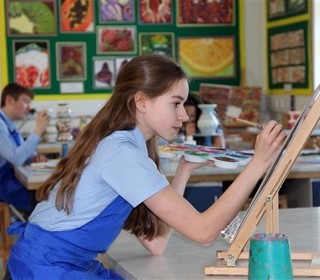 Train to Teach Art & Design
Train to Teach Art & Design
- Programme: Initial Teacher Training leading to QTS and PGCE
- Duration: 1 academic year full-time (August to July) part-time option available
- Fees: £9,535 (£8,535 QTS only) + £200 admin fee
- Bursary 2026-2027: no bursary available
- Course Code: 2XLT
- Programme Code: 24X
Click here for Pre-Application support
"Being an Art teacher is very rewarding. As well as working every day with a subject I love, I get to witness the progress and growing confidence of students in their own skills and development of their ideas..."
Jane Overton, Head of Art Farnham Heath End School
Why train to be an Art & Design teacher?
As an Art and Design teacher, you have the privilege of guiding students in discovering their artistic voices and unlocking their creative potential. Teaching creative techniques and principles, you will also nurture imagination, critical thinking, and self-expression. In a classroom alive with colour, texture, and innovation, you will witness the transformative power of art as it builds confidence, fosters cultural awareness, and encourages emotional resilience. By becoming an art and design teacher, you embark on a fulfilling career that shapes the future, one brushstroke at a time, and leaves a lasting impact on the hearts and minds of budding young artists.
How will i2i train you to become an Art & Design teacher?
Explore. Inspire. Create.
Our inspiring Art & Design programme will prepare you to teach a range of disciplines within Art & Design, including fine art, sculpture, photography and printing. You will be mentored and taught by highly enthusiastic and experienced teachers, encouraging and supporting you to apply your knowledge and skills to create inspiring and engaging lessons.
In addition to weekly Professional Study Sessions, trainees will have seven Art & Design Subject Studies days with our experienced Art & Design Subject Tutor. You will have the opportunity to explore different techniques and artistic disciplines, and learn how to make the visual arts accessible, inclusive and meaningful for all students. Each session sends you away with a clear task that allows you to put your new learning into practice, which is then shared and discussed in the following session.
Every day as an i2i Art & Design trainee offers a new opportunity to inspire and be inspired.
Entry Requirements
Alongside your passion for Art & Design, the following qualifications are required:
- GCSE (or equivalent) Grade C/4 and above in English and Maths
- An Art based A Level or equivalent is highly desirable
- Honours degree in a relevant subject. We will consider trainees who do not have a relevant degree if you have evidence of strong subject knowledge, experience in a related career and/or a strong relevant A Level
Next Steps and How to Apply
- Find out more and meet the team at one of our numerous Information Events
- Apply to our School Experience Programme to visit one or more of our schools to observe lessons and talk to current teachers
- Find out what Funding and Financial support is available
- Complete our Pre-Application Form to receive guidance and support with your application
- Submit your application via the Department for Education Apply Portal
- Provider code: 24X
- Art & Design Programme code: 2XLT
Places on our teacher training programmes are highly sought after and so you should submit your application as early as possible. Our team is here to help you navigate this process and to answer any questions you have.
Art Teacher Case Study
Charlotte Iles - Art & Textiles Teacher at Amery Hill School
Charlotte teaches Art across the whole school. Textiles to KS4 and is a Year 8 Tutor
How and why did you become a teacher?
I wanted to do a job that enabled me to be creative but to also do something that made a positive difference in the world. I knew that I would have found a 'regular' desk job boring and this is one profession that certainly isn't that. Every day is different with new challenges constantly being thrown up, but that is what makes it enjoyable. The look on a students face when they feel proud of their work, inspired or valued makes my week and that is just not something you can get from any other job.
Please describe a typical day in your role
I usually aim to get to work for about 40 minutes before the school bell rings to set up for the day and catch up on any emails I may have missed. I then run a Year 8 tutor time for 15 minutes each morning. This is a range of activities throughout the week from vocabulary revision to year group quiz competitions. I then teach on average about 5 lessons out of a 6 period day, as we are a smaller but very popular options subject so we teach a lot of the school. Break times are usually when I catch up on any emails from the morning and pop down to make a cup of tea. However, if I am on duty I will have to spend break times here manning the queue for the toilets etc. During free periods this is usually where I plan for future lessons later in the week, I tend not to mark in free periods as they go so quickly by the time I have the books laid out the bell will be about to go. Lunch time we usually have students in the room catching up on homework and borrowing some equipment so I generally eat my lunch in my room as I help them. This is something I'm trying to get better at creating a balance with, I want to restrict this to a couple of days a week to allow me some time in the staff room switching off. Then once the school day ends we generally have some kind of activity to keep us busy, this could be an after school club, staff/department meeting, detentions etc. I get most of my marking done after school (I can generally do one class in about an hour and a half) and try to limit bringing this home to keep my home life as separate as possible. Then I usually head home at about 5:30ish to make dinner.
What do you enjoy most about your profession?
I enjoy helping students to believe in themselves when they previously might not have. If I can be a positive adult influence in that students day I know that I have done what I came there to do. Seeing the enjoyment on their face when they realise they can do it and they overcame their hurdles is an incredible feeling. Inspiring them and helping them to discover new things that they are good at is the best part of the job.
What are the biggest challenge(s) you encounter in your profession?
I'm going to be honest because that's what you came here to see, the paperwork and marking can be a big challenge. I would say that marking is the most consuming part of the job and can stack up quickly if you aren't careful. However, once you get used to your schools system and find a method that works for you it can be done. I won't lie and say there isn't paperwork because there is, and none of us joined the profession to be sat filling out endless forms etc but the positives far outweigh this in my opinion and make it all worthwhile.
What are the common misconceptions people have about the work that you do?
Teaching art is easy as it's just flicking paint. Or that we clock off at 3:30 and go home to put our feet up. And yes the holidays are great and lovely and long sometimes but we do still do a lot of prep work during those, it's not just clock out and leave it all at the door.
What do you believe are the main skills you need to work as a secondary school teacher?
Patience, patience and patience! For those days when you dropped your coffee on the way to the car, spilt your lunch down your top and that one year 9 boy during period 6 thinks it's hilarious to keep flicking rubbers over the room. Being able to think on your feat and adapt to the challenges that teenagers can throw up is also vital. But mainly positivity and enjoying the job, if you like what you do and want to help those kids they will pick up on that and connect better with you as a teacher. Emotional resilience is also useful as you can't really have flat days, you have to do a bit of acting sometimes to avoid outside circumstances affecting the class.
Please tell us a little about the benefits/rewards and career development opportunities that come by joining the teaching profession.
Obviously regular holidays are a benefit as it helps to have a little re-set and refresh then. In terms of career development I am only an NQT+1 but persuaded my Head to let me design and run a KS4 textiles course. There is always an appetite to introduce new skills and interests to the school whether that be in a new course or after school club. There are countless ways you can add more responsibility to your role. It could be in a pastoral sense such as developing your interaction as a tutor in to a Head of Year eventually. Or you could move towards the SLT route and start to manage departments within the school.
What advice would you give someone wanting to become a teacher?
Make sure you are doing it for the right reasons, it is an emotionally demanding job and if you don't have the love for your subject as well as the students it will be much harder for you. Stay on top of things and don't lose sight of the bigger picture. The training year is hard and stressful but if you keep on top of what is being asked of you it is completely manageable. And don't lose sight of the wood for the trees. You will get some lessons that go terribly, but that's okay, no-one is perfect. You are making a difference in lots of young people's lives for the better, always remember that.


